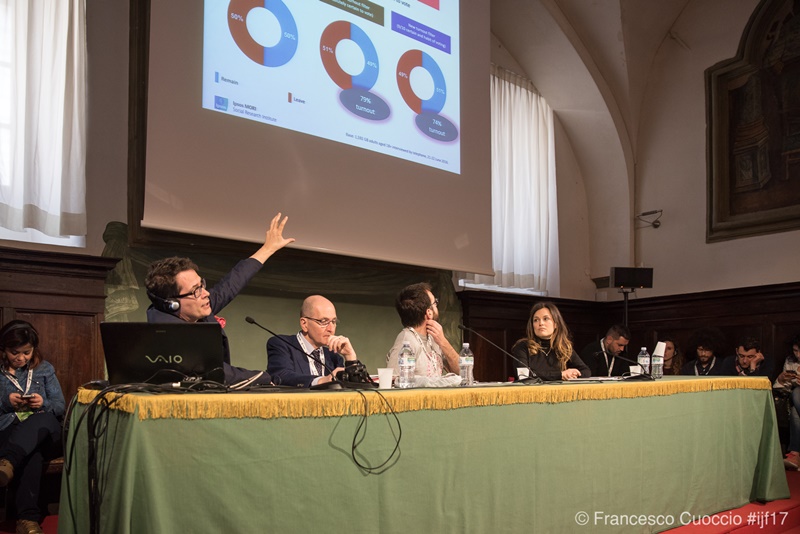 The recent referendums in the United Kingdom and Colombia, the elections in the United States… over the past few years, polls have been unable to predict the results of some important political events. Are opinion polls still an effective tool to analyse reality or there are tools that can replace them? A group of pollsters and media practitioners analyses why the surveys could not forecast these results and why media are partly responsible for that.
The recent referendums in the United Kingdom and Colombia, the elections in the United States… over the past few years, polls have been unable to predict the results of some important political events. Are opinion polls still an effective tool to analyse reality or there are tools that can replace them? A group of pollsters and media practitioners analyses why the surveys could not forecast these results and why media are partly responsible for that.
According to Nando Pagnoncelli, president of Ipsos Italy, we still need to use opinion polls as a tool to predict the future. Even though they have failed in some occasions lately, they still do work most of the times. In the opinion of Mr. Pagnoncelli, some challenges arise from the methods used by pollsters in their work. Additional complexities also come from the enormous political fragmentation in the society, compared to the past. Mr. Pagnoncelli underlines that pollsters always need to consider a margin of error for their results. But the way this margin is analysed is a matter of expectations. In politics, this can mean the failure of a party, in marketing polls, just a smaller margin of profits for a company.
Nando Pagnoncelli explains that another major issue is the volatility of voters’ opinions. This is particularly relevant in Italy, where often voters make up their minds on the same day of the elections and therefore it is very difficult to forecast the result. The case of the 2013 elections is emblematic: more than 40% of electors changed their vote at the very last moment making the event highly unpredictable.
Ben Page, CEO of Ipsos Mori, insists on how accurate election polls have been in most of the cases, including in the latest elections in the Netherlands. But the more volatile politics become, Mr. Page agrees, the more difficult it is to predict the results. Concerning the case of Brexit, according to Mr. Page, most Brits were not interested in knowing anything about the EU. This means they would certainly make a decision close to the election and so, it would be difficult to foresee the result in advance. The problem with opinion polls is that they stop the day before the elections and most people decides the day of the elections itself, Mr. Page explains. Therefore, pollsters have to guess who, among the interviewees, will hold on his decision.
How Trump turned bad opinion polls into a good campaign
Paola Tommassi works for the Italian political party Forza Italia. Ms. Tommassi had the chance to closely follow Donald Trump’s campaing. According to Ms. Tomassi, Trump spent most of his campaign meeting people, questioning them about their interests and concerns. All the topics of the campaign were selected according to the result of several surveys conducted among the voters. Donald Trump was then adapting his speeches to the worries expressed by the people, their behaviour or even their city of residence. If there was a bad opinion poll in a small town, he was going there, finding out what the problem was and promising to do something about it.
Although this particular experience is not related to the capacity of polls to predict electoral result, it shows how important qualitative data can be in order to build a successful electoral campaign.
Media and pollsters, a complicated relationship
Pollsters of course do not want to mislead people but they have to guess, Ben Page underlines. First, it is necessary to better communicate to media about the margin of error every opinion poll has. And second, “we need to be honest”, he insists. Being honest means recognising that pollsters are human beings hence opinion polls contain some subjective judgement and, some times, they fail to forecast voters’ behaviours.
In Nando Pagnoncelli’s opinion, pollsters need to work on media’s expectations. “They want to know the result and we are sort of forced to propose an estimate figure”, Mr. Pagnoncelli explains. However, this is not always possible. Moreover, Mr. Pagnoncelli criticises how sometimes media try to establish links between irrelevant events such as the stepping-down of Pope Ratzinger or the acquisition of a very important football player by a team, and elections. Sometimes, media seek for polls to justify facts, overreact to simple surveys, or even publish fake polls. This is why Mr. Pagnoncelli considers that the accurate use of information extracted from polls is a shared responsibility between pollsters and media. In short, journalists wants stories “but there is always an error in every figure and we need to be clear on that”, Mr. Page insists.
Paraphrasing Winston Churchill, Nando Pagnoncelli concludes that polls are not a perfect way of predicting election results but are still better than all other systems we know.